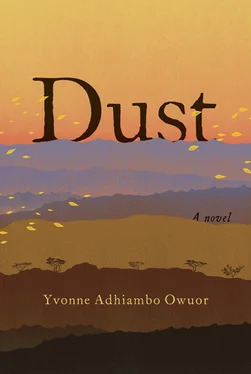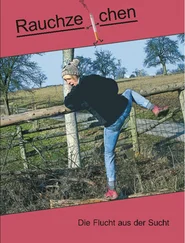Petronilla’s counterpoint: “Leave me this one — leave me this one — leave me this one at least.”
“Theo!” Nyipir’s brother had turned, faced him, and raised his hand in salute.
“Owadwa adwogo.” I’ll return, bro.
The train had gained speed. Petronilla let Nyipir run after it as far as he could. It left him far behind. He stared at the rails until the station-master chased him away. Nyipir memorized journeys his brother and father took: Madagascar, to fight against Vichy France. Back to Kenya. Mombasa to Burma and the 1944 Monsoon Campaign.
And then a period came that was woven from sorrow alone. Petronilla Ajany, his mother, died — snakebite when she was washing in the river. Nyipir’s uncle took over the family’s goods and lives. He commanded Nyipir to tend to his baby sister, Akoth.
One night, six months after his mother had died, Akoth, who had been restless and hot, coughed, looked at him, and, even as he clung to her, became very, very still.
Uncle took Nyipir away from school, told him to herd the family livestock. Nyipir reread old schoolbooks, prayed, and waited for his father and brother to come home. They did not, not with the men marching back home from war fronts. Changed men like Baba Jimmy, who brought a Spanish guitar that he plucked like the nyatiti . Baba Jimmy was a giant with a hoarse, tearing voice, a descendant of musicians who make the lyre weep. Gangrene had eaten Baba Jimmy’s toes during the war, and now he hobbled. He never explained why his body lurched in twisted angles as he moved.
Nyipir had run to him: “Ere baba, ere Theo?” Where are they?
Baba Jimmy shuffled ahead, his guitar swinging on his back, told Nyipir to direct his questions to God. He relented. “ Gi biro .” They are on their way.
Nyipir heard the condensed sadness in Baba Jimmy’s voice, the source of music.
“Come, boy, sing,” Baba Jimmy suggested. He wanted to stop Nyipir’s no-answer questions. From within the army coat he still wore, he dug out a brown-and-silver mouth organ. Baba Jimmy dangled it on the tips of his fingers and let it fall into Nyipir’s open hands.
“Inhale, exhale.” Hollow laugh, cheerless eyes.
Nyipir counted sixteen holes before lifting the instrument to his lips, eyes on Baba Jimmy.
“Breathe in, breathe out.”
Nyipir did.
“Open your mouth, whistle. With your lips, cover these holes; don’t move until you know the name of the sound.”
They had turned old stories into songs without words.
It was the evening of a cold day in Kisumu; Nyipir milked the animals and settled them in for the night. He went to his hut. And then his uncle came to count the Oganda animals. Two goats that had eaten poisonous weeds died that evening. Uncle returned with boka rao . He raised the length of whip. It connected with the side of Nyipir’s face the first time. By the second blow, Nyipir had picked up the hoe next to his mat and swung it at his uncle. The hoe hit its mark with a crunch. Maybe it split Uncle’s head, because there was a small, spurting fountain of blood, which in the dimness looked very black, and Uncle whimpered.
Nyipir did not wait.
He ran. And when he stopped, he found he had crawled into Baba Jimmy’s granary. The next afternoon, when Baba Jimmy found Nyipir hiding there, he said nothing, closed the door, returned with a calabash of water, and closed the granary door again.
Three days later, Baba Jimmy told Nyipir a story, which they would turn to melody:
“Listen.… Chon gi lala , a greedy hyena, had a brother. The brother was a warrior and went on a journey. This hyena opened its big mouth to swallow his brother’s home. He also tried to swallow the brother’s son, except this son was bigger than the hyena’s open mouth.…”
Baba Jimmy played. Nyipir listened, he cried, and then he wiped his face with his arms.
“Thu tinda …” concluded Baba Jimmy. The end.
“Baba Jimmy, how do I go to Burma?” Nyipir asked seconds later.
Two weeks later, Baba Jimmy and Nyipir left for the Catholic Mission Orphanage and School that was in a village in Kisii. Dressed in their Sunday best, Baba Jimmy wearing his two war medals, footsteps on dusty roads. They walked for four hours to meet the blue bus. Nyipir walked backward, ahead of Baba Jimmy, staring at the gleaming medals.
They had approached a forested patch, the green so different from the dust of the plains that it caused Nyipir to tremble.
He told Baba Jimmy, “I want to go back home with you.”
“You want to go to Burma?” Baba Jimmy demanded.
“Yes!” Nyipir yelled.
“Boy”—he pulled away his hands—“when you get out of this bus, after your feet reach the ground, don’t look back. Only a hyena travels the same road twice.”
AJANY READS THAT IN 2006 ENGINEER JEREMIAH MUSALI OF Tich Lich Engineers received the Gedo Award — a red-and-green rhino-horn-shaped protuberance — for regional engineering excellence and innovation. Ajany rereads the bronze plate in the pale-yellow-and-rust-red T. L. Associates Engineering offices in Lavington.
A cursory glance. In an alcove, a glimpse of a blown-up picture. Ajany moves closer. Five men in white-and-yellow hard hats. Behind them, the Kiambere power plant. In the middle, a man taller, broader, more muscular, and darker than all the others, with a thin mustache, his hair cropped close to the skull, his coat stretched over his body. Moses Ebewesit Odidi Oganda in a charcoal-gray suit, with a gap-toothed grin.
“Odidi!” Ajany cries.
She stands dry-mouthed. Hears a car slowing down outside. Petrol engine, four-liter engine . Smell of sprayed-on, bottled newness everywhere. The photograph. Odidi.
A woman in a flowing green dress walks in.
“Hello,” she says. “May I help you?”
Ajany grabs her arms, points at the picture. “My b-brother …”
“Sorry, madam?”
“Moses Odidi Oganda. I’m his sister!”
The woman pulls away.
“ Eh … wait here.” She points at green chairs nearby, seizes a handset, and spits into the receiver.
Ajany stands next to the chair, gripping the armrest, eyes focused on the photograph, her heart beating.
A turbaned man of medium height in a tight German suit hurries in. The receptionist calls to him. They exchange quiet words, and he turns toward Ajany. “Odidi’s sister?” He rushes over to pump her hand. “I’m Joginder. Uh, you know, uh … he left … maybe two years … maybe … ago. He … uh … hasn’t, uhhh, called since.…”
Ajany stares.
He says, “Uhhh … wait.”
He turns. Neat, hurried steps down a corridor.
Ajany’s hands are damp. She wipes them on her skirt. The receptionist is answering phone calls.
Coffee appears.
Ten minutes.
Half an hour.
At four-twenty-two, Engineer Jeremiah Musali appears. He is not as thin, highly strung, or twinkly as he used to be. There are, however, traces from the past. Musali practically leaps into Ajany’s arms. High-pitched voice, more fashion than steel; well-oiled, short hair with little waves. Manicured hands. Still handsome, he wears round glasses, like Gandhi’s. Copper skin, ocher highlights. A brace around his neck.
“Arabel ‘A. J.’ Oganda! Ei! Let me see you,” He looks her up and down. “Such a ka-lady! Brazil! You went faaaar !”
Ajany takes two steps back. “Yes … uhm … Musali, was wondering about my b-brother?”
Musali’s eyebrows make small movements across his forehead. They are subtly plucked. His facial bones hold his muscles close to their structure. And, like an old person’s, his ears are longer than his nose. Time seemed to have rubbed out the tiny lights that used to make his face a most mobile presence, fascinating to watch. Still, his would be a curious face to sculpt. Musali exhales hard, looks at the carpet. “Hasn’t he contacted you?”
Читать дальше











